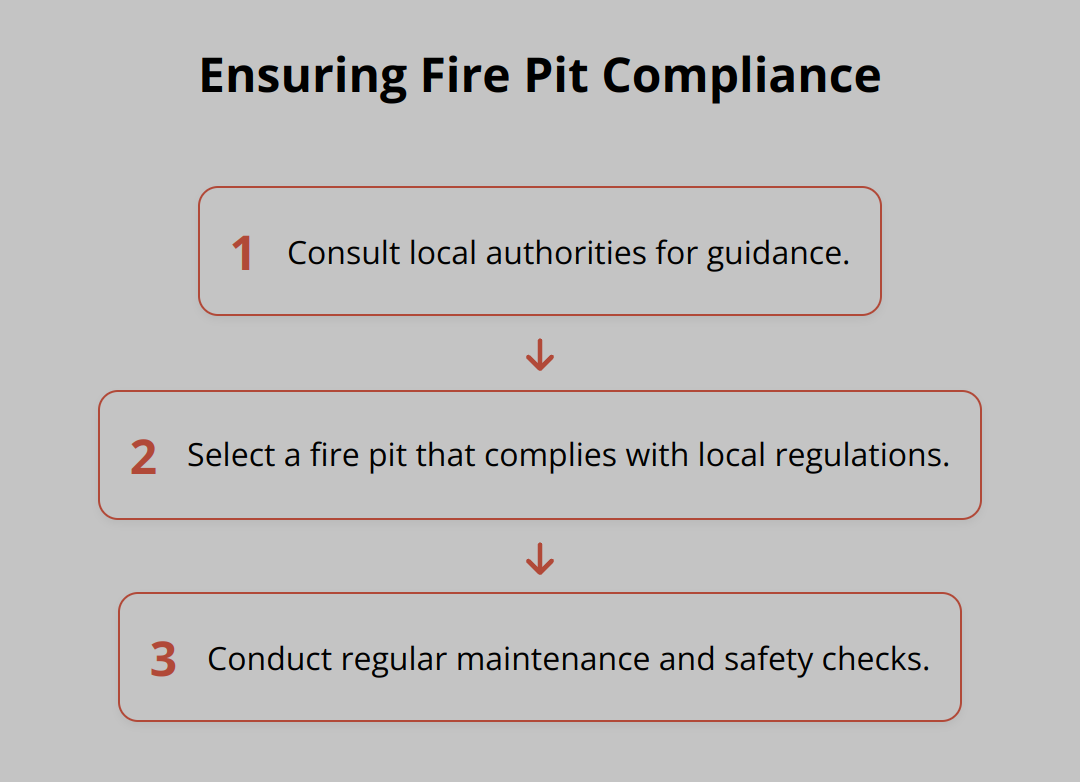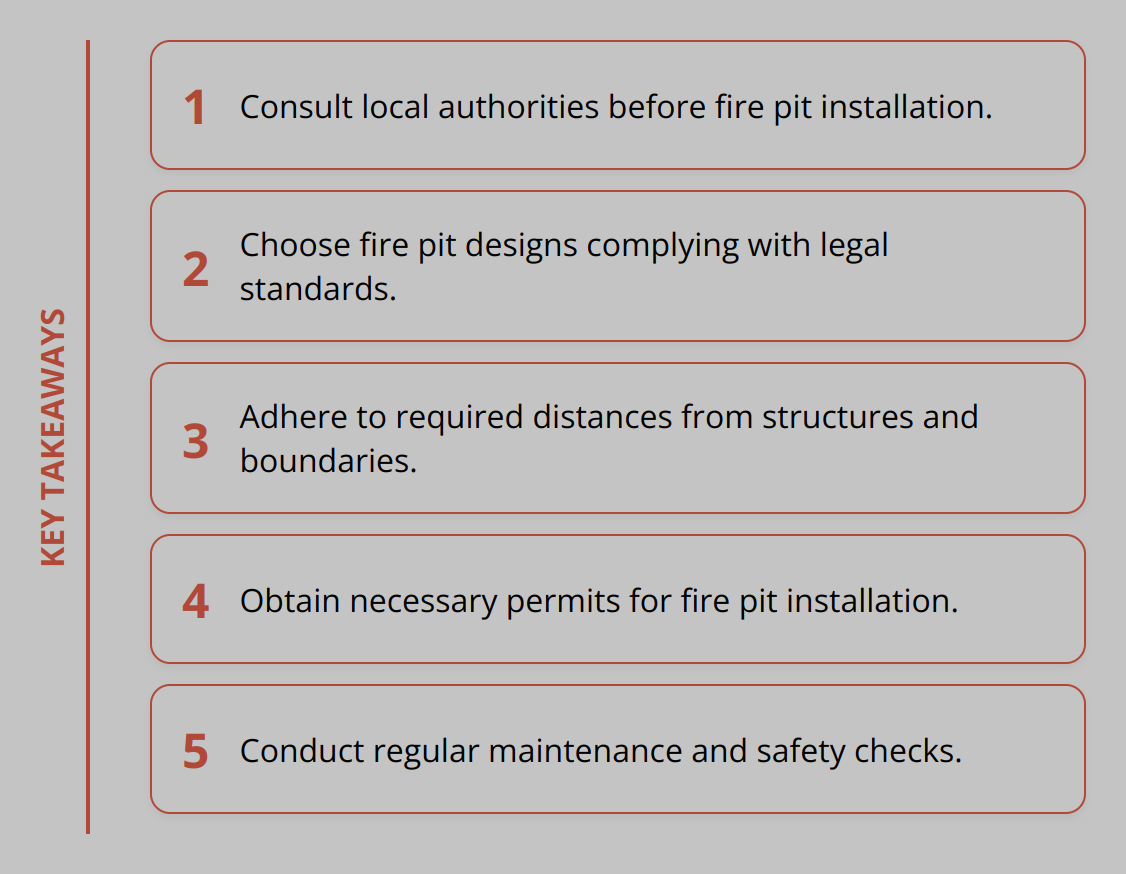At S&S Fire Pits, we understand the importance of fully grasping local fire pit zoning laws before adding one to your outdoor space. Knowledge of these regulations not only prevents legal and financial headaches but also ensures the safety and harmony of your community.
Navigating through zoning laws might seem daunting, but with the right information and approach, it’s a straightforward process that deeply enhances your fire pit experience.
Navigating Fire Pit Zoning Laws
When it comes to enhancing your outdoor living space with a fire pit, understanding the local zoning laws is not just beneficial—it’s essential. Compliance with these laws is key to ensuring the legality, safety, and enjoyment of your outdoor fire pit.
Why Knowing Your Local Regulations Matters
The significance of familiarizing yourself with local fire pit regulations cannot be overstated. It helps avoid potential fines or penalties and ensures your fire pit is a joy rather than a nuisance to your community. More importantly, it upholds safety standards that protect you, your property, and those around you. Ignoring these laws can have serious consequences, ranging from legal issues to increased risk of fire hazards.
Sources for Accurate Zoning Law Information
The most reliable source of information on zoning laws is typically your local government’s website or offices. They provide the most up-to-date and specific regulations applicable to your area. Alternatively, consulting with a local legal expert or a fire safety officer can offer insights into understanding and applying these laws to your advantage.
For those in need of guidance about responsible ownership, the focus on fire pit safety offers actionable advice on adhering to both local laws and best practices for fire pit use. Typical regulations include restrictions on the type of fire pits allowed, distance from structures, and materials that can be burned.

Common Restrictions and Allowances
Every area has its quirks regarding what’s permitted and what’s not. However, here are some common themes you might encounter:
- Distance Requirements: Many localities require fire pits to be a certain distance from your home and your neighbor’s yard.
- Type of Fire Pit: Some areas may only allow gas fire pits, while others permit wood-burning, provided they include a spark screen.
- Burn Bans and Weather Conditions: Restrictions often apply in times of drought or on windy days to prevent accidental fires.
- Permits: Certain areas might require you to obtain a permit before installing a fire pit.
Understanding the local landscape of fire pit zoning laws ensures you can enjoy your outdoor space without worry. By keeping informed and compliant, you create a safer, more harmonious community for everyone. Remember, the goal is not just to follow the law but to foster an environment where everyone can savor the warm, inviting glow of your fire pit responsibly.
Why Comply?
Adhering to local fire pit zoning laws is not just a bureaucratic necessity; it’s a roadmap to enjoying your outdoor space worry-free and with full benefits. Compliance shields you from fines and legal trouble, markedly enhances safety, and upholds the value and serenity of your property and neighborhood.
Avoiding Fines and Legal Troubles
Failure to comply with zoning laws can lead to heavy fines or even legal actions. It’s essential to understand these laws can change; staying informed and proactive is your best defense against unexpected penalties. A common mistake is assuming that small, portable fire pits are exempt from regulations. This is not always the case, and overlooking this detail can be costly.

Enhancing Safety
Compliance isn’t just about ticking boxes on a legal checklist; it’s primarily about safety. By observing proper placement, using the right fuels, and adhering to burn bans or wind advisories, you significantly reduce the risk of accidental fires. This not only protects your property but also safeguards your community. Often, regulations are in place because they are proven to minimize hazards that you might not have considered.
Preserving Property Values and Neighborhood Harmony
An often-overlooked benefit of complying with zoning laws is the positive impact on your property’s value and neighborhood relationships. A well-placed, legally compliant fire pit can be a desirable feature that enhances your home’s appeal. Conversely, non-compliance can lead to disputes with neighbors or even decrease your home’s marketability if unaddressed violations are discovered during home inspections.
Moreover, thoughtful compliance contributes to neighborhood harmony. It shows respect for your community’s standards and minimizes disruptions caused by smoke or noise that could strain relationships with your neighbors.

For those keen on enhancing their outdoor spaces responsibly, compliance offers a clear path to peace of mind. It paves the way for countless safe, enjoyable evenings by the fire, free from the worry of legal repercussions or safety hazards.
Adhering to these guidelines not only ensures a smoother, more enjoyable experience for you and your guests but also preserves the integrity and safety of your neighborhood. Always keep the big picture in mind: a harmonious, safe, and legally compliant outdoor living space benefits everyone involved.
For more practical tips on creating a safe and welcoming outdoor environment, fire pit safety tips offer valuable insights.
Ensuring Fire Pit Compliance
To ensure your fire pit experience is both enjoyable and compliant with local regulations, a practical approach is required. Focusing on compliance from the outset not only enhances safety but also maximizes the enjoyment of your outdoor space. Here are actionable steps to adhere to zoning laws effectively.
Consultation Is Key
The first step is always to reach out to local authorities or fire safety officers for guidance before installing your fire pit. They offer the most accurate, area-specific advice that can save you from future legal and financial penalties. This proactive approach demonstrates your commitment to community safety and legal adherence, setting a positive precedent for responsible fire pit ownership.
Selecting the Right Fire Pit
Choosing a fire pit that aligns with local regulations is a fundamental step towards compliance. Whether the law favors gas over wood-burning fire pits or prescribes specific designs like those equipped with spark screens, your selection should reflect these requirements. It’s wise to opt for designs known for safety and efficiency, thus meeting legal criteria and optimizing your backyard experience. Research is crucial; browsing the latest fire pit design trends can offer insights into compliant and stylish options.
Commit to Regular Maintenance
Regular maintenance and safety checks are non-negotiable for responsible fire pit ownership. Inspecting your fire pit for damages, ensuring it’s clean from debris, and checking gas connections for leaks if you own a gas model, contribute significantly to safety and compliance. Scheduled maintenance prevents accidents and ensures your fire pit remains a source of joy rather than a liability.

- Always consult local authorities before installation.
- Choose designs in line with legal requirements.
- Schedule regular maintenance and safety inspections.
These steps represent a practical framework for aligning with zoning laws and enhancing the safety and enjoyment of your fire pit. By prioritizing consultation, selecting the right fire pit, and committing to regular maintenance, you create a compliant and inviting outdoor space that respects both the law and the overall well-being of your community.
Continuing to stay informed and attentive to your fire pit’s condition will ensure it remains a cherished feature of your outdoor living space for years to come.
Final Thoughts
Understanding and complying with fire pit zoning laws is paramount for any homeowner looking to enhance their outdoor living space with a fire pit. This knowledge not only ensures your outdoor gatherings are legal but also safe for everyone involved. At S&S Fire Pits, we cannot stress enough the importance of prioritizing community safety and legal adherence to create an enjoyable and worry-free environment for your fire pit experiences.

Engaging with your local zoning boards and fire safety officers should be seen as a proactive step towards achieving optimal enjoyment of your outdoor space. These interactions provide you with the necessary guidance to select the appropriate fire pit that meets both your aesthetic desires and safety requirements. Our selection at S&S Fire Pits offers a variety of handmade fire pits that cater to those needs, complying with the highest standards of quality and durability.
The essence of a memorable outdoor gathering around a fire pit lies in the confidence that you’ve taken all necessary precautions for a safe and lawful setup. It fosters a sense of harmony and respect within the community, ensuring that your fire pit becomes a source of joy and not contention.
We encourage every fire pit enthusiast to take these steps seriously:
- Engage with local authorities
- Prioritize safety and legal compliance
- Choose quality and compliant fire pits
By following these guidelines, you’re not only enhancing the enjoyment of your own home but also contributing to the safety and well-being of your entire community. Let’s ensure our love for outdoor living respects the bounds of law and safety, guaranteeing countless delightful evenings by the fire.


